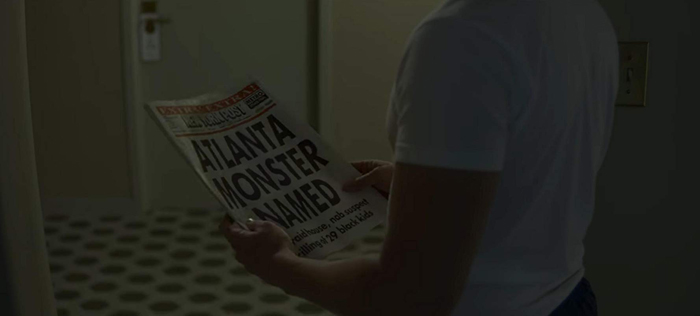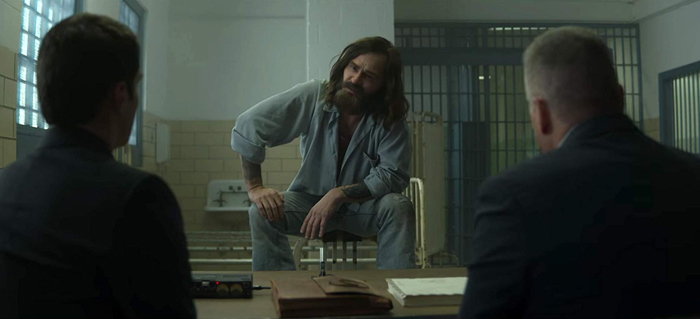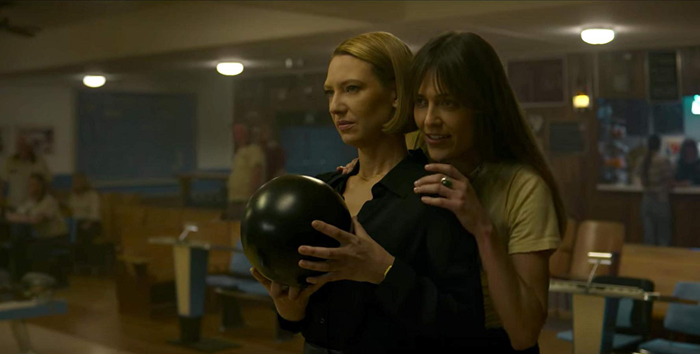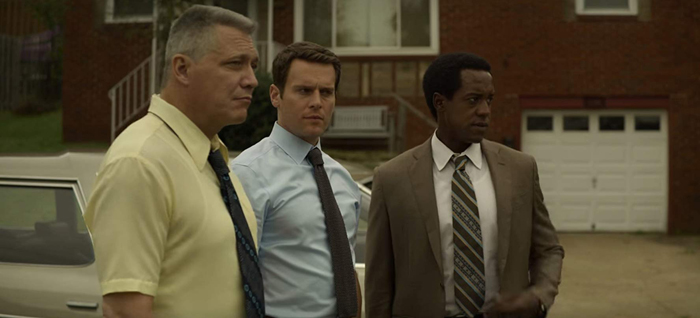2 years. A lot can happen in two years. Consider age: 2 years can take you from 16 to legal adult; from sober at 19 to boxed wine at 21. 2 years is long enough to get an Associate’s Degree. Long enough to fall in and out of love, at least once. So it’s a hell of a long time to go between seasons of Mindhunter, the Fincher, all the way down, procedural of my heart. I went into season 1 with the hardened blinders of a devout Hannibal fan – the idea that another dreamy, atmospheric show would borrow from the same well Hannibal did, hardly sat well with me. But I am consummately rational, the honesty of that statement open to the interpretation of the reader, and goddamn it, the show won me over. I really liked season 1. But 2 years is a long time… would season 2 taste as wonderfully bitter, or would it be a lesser creation, or, in some ways worse, would I just not care anymore?
I am happy to report that season 2 is magnificent. The ingestion and interpretation of any sort of media is, by its nature and definition, subjective, but by every reasonably measurable metric, it eclipses season 1 – the narratives are richer and more fraught, the serialized elements more harrowing and the characters are as nuanced and flawed as ever. I am going to, within the confines of this review, provide a seasonal overview of what is a plot-dense, thematically rich show, while attempting – at best – to curb my own propensity for the verbose. Please be patient then with the generalities I will limit myself to, and what’s more, know that if you intend to watch the show, what may seem like a liability is in fact a benefit. Letting season 2 happen to you with limited awareness is a gift, and one that I am more than happy to bestow on you, after all these many years we’ve spent together. So let’s start at the top.

Season 2 picks up exactly where season 1 left off. There is, as such, some necessity towards getting the band caught up and back together, but the show is aware that no one is too invested in exposition. We get into the gristle pretty quickly. Season 1 served as a great foundation: our heroes, Holden (beautiful sprite alien), Bill (a hardened, but still unexpectedly soulful buzz cut alpha male), and Wendy (educated, outsider, mental health professional) are beginning to be able to use the rules and lessons they dedicated their energy towards establishing in season 1 to actually solve crimes. Wendy is dubious; she feels like she would prefer the methods to be preventative, in identifying psychopathic behavior and treating it, instead of punitive. Holden thinks they should use whatever they have, and that applying the principals towards eliciting a confession makes as much sense as anything else. A new big boss at Quantico supports the development of the Behavioral Science Unit for mostly political reasons – the bragging rights of being the man who brought a revolutionary new method to law enforcement – which allows Holden and Bill a much longer leash. And while we do get to see a bit of the patented Holden/Bill interviewing murderers magic (Manson! Berkowitz!), there is much more time now dedicated to actually solving cases. Bill is casually investigating BTK and both of our heroes end up in Atlanta, pursuing a child murderer.

There is a million percent more nuance and plot development at play, but to get too deeply into any of it risks two very real and present dangers: 1. Ruining the pleasure of experiencing it, and 2. Making it impossible for this review to be less than 20 pages. Let’s keep our numbers reasonable. So instead of digging deeper into the plot, let’s take a brief look at each of our principle characters and what they bring to the season. I’m saving Holden for last, so if you’re just here for him, skip two paragraphs.
We’ll start with Wendy, since she has the least to do this season. I am certain that her side-lining will cause outcries of “of course the woman gets sidelined”, and listen, I’m as chafed feminist as the next guy. But narrative honesty sort of dictates that she be omitted a bit. She isn’t an FBI agent, and let’s be frank, watching someone collate information isn’t particularly kinetic. Wendy gets the more personal narrative this season. She meets a woman, she starts a relationship. She tries to lead a semi-normal life, but she reflects well how working with and on diseased minds can be detrimental to leading a happy, full life. Do I wish she’d had more to do? Hell yes. Am I mad about it? Nah.

Bill, meanwhile, could be arguably a bigger star this season than Holden. He certainly has more narrative heavy lifting. Something genuinely unthinkable happens in his personal life – something that would be devastating to anyone but is magnified and multiplied by the nature of the work he does – and as a result, he finds himself having to travel to Atlanta from Virginia and back again every week. He could easily stand as a metaphor for the old guard crumbling, defenseless in the face of the future – he has all the tools to recognize what’s happening and absolutely no capacity to prevent it.
And then there’s Holden, my beautiful, wonderful problem child. I could pretty easily write an entire essay on the power of Jonathan Groff’s performance, as someone who will – future tense – be viewed as visionary, but in the present tense, in the now, is just alienated and other. He reaches for connections, but has trouble making them. He has panic attacks at a time when anxiety was treated as simply being soft. Even Bill, who is relatively enlightened, simply tells him to get his shit together. Fortunately, Mindhunter is smart enough to know that anxiety isn’t something you just decide to “get your shit together” with, and never treats Holden’s anxiety as just a weakness to overcome. Holden remains arrogant and inflexible. He is a challenging character, who grows in empathy this season but is and will always be difficult. Human, but mostly just by definition.

Seeing that I am running long, I want to put in a quick, triumphant word about Mindhunter‘s continued commitment to Holden and Bill’s partnership. It’s not represented as particularly warm and fuzzy. And it has the complications that friendships between men often do (Bill never expresses any kind of apology through actual acknowledgment of being wrong, he does it by supporting Holden in difficult situations) but it is strong, and continues to shine bright, as a beacon of two men who ultimately respect and understand each other when we see them interrogating a suspect. Their balance and sympathy towards each other accomplishes the remarkable feat of making asking a guy questions absolutely riveting.
Listen, I know, you know, we all know that I could talk all day about this. But use your time better. Borrow someone’s Netflix password and binge watch Season 2 of Mindhunter. It’s worth your time.

